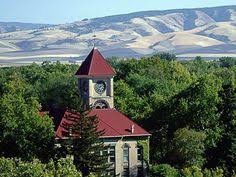Townie

"We're the same, hardly different, but seem so different, hardly the same at all."
When I tell people that I grew up in Walla Walla, Washington, most quite understandably consider me to be a country boy, though I'm not. Yes, I grew up surrounded by country, but my birth family lived in town, actually a small city featuring pretty much every amenity one might find in any large city. I went to grade and high school with country kids, ones who rode busses long miles in from farms and ranches out in what I, as a townie, considered to be the hinterlands every bit as much as my big city-bred colleagues consider my hometown to be a backwater. I was raised on Pleasant Street, a few bicycle-shortened blocks away from a corner grocery, grade school, and the primary city park. I grew street savvy cruising alleyways on that bike, discovering shortcuts, and delivering newspapers. I told The Muse when I first met her that I grew up in a Walt Disney movie. She later confirmed my assertion when she visited the place. ©2018 by David A. Schmaltz - all rights reserved
My small city held a microcosm of the larger world. Brothels lined South Main Street in my youth. The State Penitentiary, still located at 1313 13th Street, served as the outward boundary of the territory we considered to be on the other side of the tracks. My family lived on the opposite side of town near the original artesian source of the city's water, on what was once orchard land, still retaining ever-aging fruit trees: crabapple, apricot, and pear, and a grape vine whose fruit could turn teeth into sandpaper. Our neighborhood was diverse in its way, with attorneys, shopkeepers, and even a movie theater owner living next door to my postal clerk dad. Big and small houses seemed to comfortably coexist.
The Muse grew up on a wheat and soybean farm ten miles from the nearest town, which was a couple of blocks of wide spot just off the road to Minneapolis. She's a country girl. Her family raised chickens, sold eggs, and annually butchered and canned the flock. She lived on an unpaved section road and broke virgin prairie driving a plow when I was still rolling newspapers. Town was a trip away and visits meant stocking up because no handy corner grocery stood a few bike pedal pumps down the street. She drove combine as a birthright, not just as a diverting summer job. She lived the life people innocently ascribe to me. Townies turn out to seem kind of phony to big city as well as country kids. No, I don't know anything about animal husbandry.
I grew up convinced that I'd been slighted. Why, I wondered, could I have not been born in a real place like New York or Los Angeles, the places I'd seen on television and desperately wanted to see in person? I had to settle for a second-hand miniature version, one I could comfortably bike across in under an hour, one where everyone seemed to know everyone else. I suppose I sought the anonymity every pioneer seeks, the space to reinvent myself however I might please, the same impetus that fueled my forebears West in the first place. I felt like the family line had stalled out in a backwater. I wanted out.
Just before I turned fifty, The Muse and I moved back to become townies. We'd by then seen New York and Los Angeles and found little attractive about the prospect of living in either place. We'd lived in Minneapolis and Portland respectively, and felt ready to re-inhabit that mysterious middle space again, neither city nor country dwellers, but townies. I suppose experience puts a place into perspective. The place lost much of its cosmopolitan nature I remember from my youth, transformed into a wine destination now. It's lost some its former seediness and also some of its former charm. It feels every bit like home, anyway.
We were exiled from that town after the 2008 crash and went to live in the Washington, DC Metro area, an experience that, I can honestly say, didn't actually kill either of us, mostly because we found digs in an amenable small city almost on the outskirts of the metropolis itself, a town in its own way, though hardly surrounded by country. A proper town, I firmly believe, should sit in territory any city-dweller should justifiably consider to be hinterland but really isn't. Us townies understand that those who think we're hicks disclose their own parochial nature when so characterizing us. We're the same, hardly different, but seem so different, hardly the same at all.


